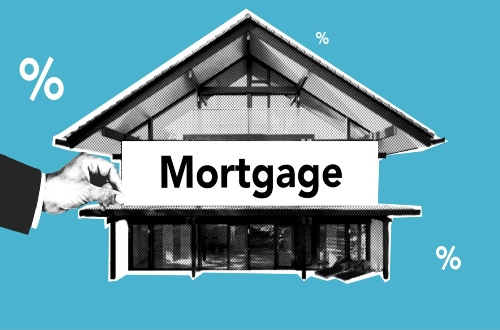Understanding Mortgage Interest: Fixed vs. Variable Rates Explained

Choosing the right mortgage interest rate is one of the most critical decisions when buying a home. The type of rate you select—fixed or variable—can significantly impact your monthly payments, long-term costs, and financial stability. In this comprehensive guide from JumboCalculator, we'll break down the differences between these two mortgage types, their pros and cons, and how to use our Mortgage Calculator to determine which option works best for your financial situation.
What Is a Fixed-Rate Mortgage?
A fixed-rate mortgage locks in your interest rate for the entire loan term, meaning your monthly principal and interest payments remain unchanged.
Pros of Fixed-Rate Mortgages
- Predictable Payments – Your mortgage payment stays the same, making budgeting easier
- Protection Against Rate Hikes – If interest rates rise, your rate stays low
- Long-Term Stability – Ideal for homeowners planning to stay in their homes for many years
Cons of Fixed-Rate Mortgages
- Higher Initial Rates – Fixed rates are often higher than introductory variable rates
- No Benefit from Rate Drops – If market rates fall, you won't see savings unless you refinance
Best for: Homebuyers who prioritize stability and plan to stay in their homes long-term. Use our Fixed-Rate Mortgage Calculator to estimate your payments.
What Is a Variable-Rate Mortgage (ARM)?
A variable-rate mortgage (ARM or adjustable-rate mortgage) starts with a lower introductory rate that changes periodically based on market conditions.
How Variable Rates Work
- Initial Fixed Period (e.g., 5/1 ARM) – First 5 years at a fixed rate, then adjusts annually
- Adjustment Caps – Limits how much the rate can increase per adjustment period
- Index + Margin – Rate is tied to a financial index (like the Prime Rate) plus a lender-set margin
Pros of Variable-Rate Mortgages
- Lower Initial Rates – Cheaper payments in the short term
- Potential Savings – If interest rates drop, your payments decrease
- Flexibility – Good for those planning to sell or refinance before rates adjust
Cons of Variable-Rate Mortgages
- Unpredictable Payments – Monthly costs can rise significantly if interest rates climb
- Risk of Payment Shock – Large rate hikes could make payments unaffordable
Best for: Borrowers who expect to move or refinance before the rate adjusts, or those comfortable with risk. Calculate potential ARM payments with our Adjustable-Rate Mortgage Calculator.
Fixed vs. Variable Rates: Key Differences
| Feature | Fixed-Rate Mortgage | Variable-Rate Mortgage (ARM) |
|---|---|---|
| Interest Rate | Stays the same | Changes periodically |
| Initial Rate | Typically higher | Lower introductory rate |
| Payment Stability | Consistent payments | Payments can fluctuate |
| Risk Level | Low risk | Higher risk if rates rise |
| Best For | Long-term homeowners | Short-term owners or risk-tolerant buyers |
How to Choose Between Fixed and Variable Rates
1. Consider Your Timeline
- Staying 7+ years? → Fixed-rate may be safer
- Moving in 3-5 years? → A variable-rate ARM could save money
2. Evaluate Interest Rate Trends
- Rising rates? → Lock in a fixed rate
- Falling or stable rates? → A variable rate might be advantageous
3. Assess Your Risk Tolerance
- Prefer stability? → Fixed rates eliminate surprises
- Comfortable with risk? → Variable rates offer short-term savings
4. Check Your Budget Flexibility
- Tight budget? → Fixed rates ensure no payment shocks
- Higher income flexibility? → You might handle potential ARM increases
Pro Tip: Use our Mortgage Comparison Calculator to see side-by-side comparisons of fixed and variable rate scenarios based on your loan amount and timeline.
Hybrid Options: Split-Rate Mortgages
Some lenders offer split mortgages, where part of the loan is fixed and part is variable. This balances stability with potential savings.
Example:
- 60% fixed, 40% variable → Some payments stay steady, while others fluctuate
FAQ: Fixed vs. Variable Mortgage Rates
Q: Can I switch from a variable to a fixed rate later?
A: Yes! Many lenders allow you to convert to a fixed rate, sometimes for a fee.
Q: How often do variable rates adjust?
A: Typically annually after the initial fixed period (e.g., 5 years in a 5/1 ARM).
Q: Which is cheaper in the long run?
A: It depends on interest rate trends. Historically, variable rates often cost less, but fixed rates provide certainty.
Q: Are variable rates riskier?
A: They can be if rates rise sharply, but rate caps limit how high they can go.
Q: Should I refinance if rates drop?
A: If you have a fixed-rate mortgage, refinancing when rates fall could save money. Use our Refinance Calculator to check potential savings.
Final Verdict: Which Should You Choose?
Choose a Fixed-Rate Mortgage If:
- You want predictable payments for the long term
- You're not planning to move soon
- You prefer financial stability over potential savings
Choose a Variable-Rate Mortgage If:
- You plan to sell or refinance before adjustments
- You're comfortable with some risk for lower initial payments
- You believe interest rates will stay low or decrease
Next Steps
- Use our Mortgage Calculator to compare fixed vs. variable payments
- Consult a mortgage advisor to discuss your best option
- Monitor interest rate trends before locking in a rate
By understanding the differences between fixed and variable mortgage rates, you can make an informed decision that aligns with your financial goals. Whether you prioritize stability or flexibility, choosing the right mortgage rate will help you save money and secure your dream home with confidence.